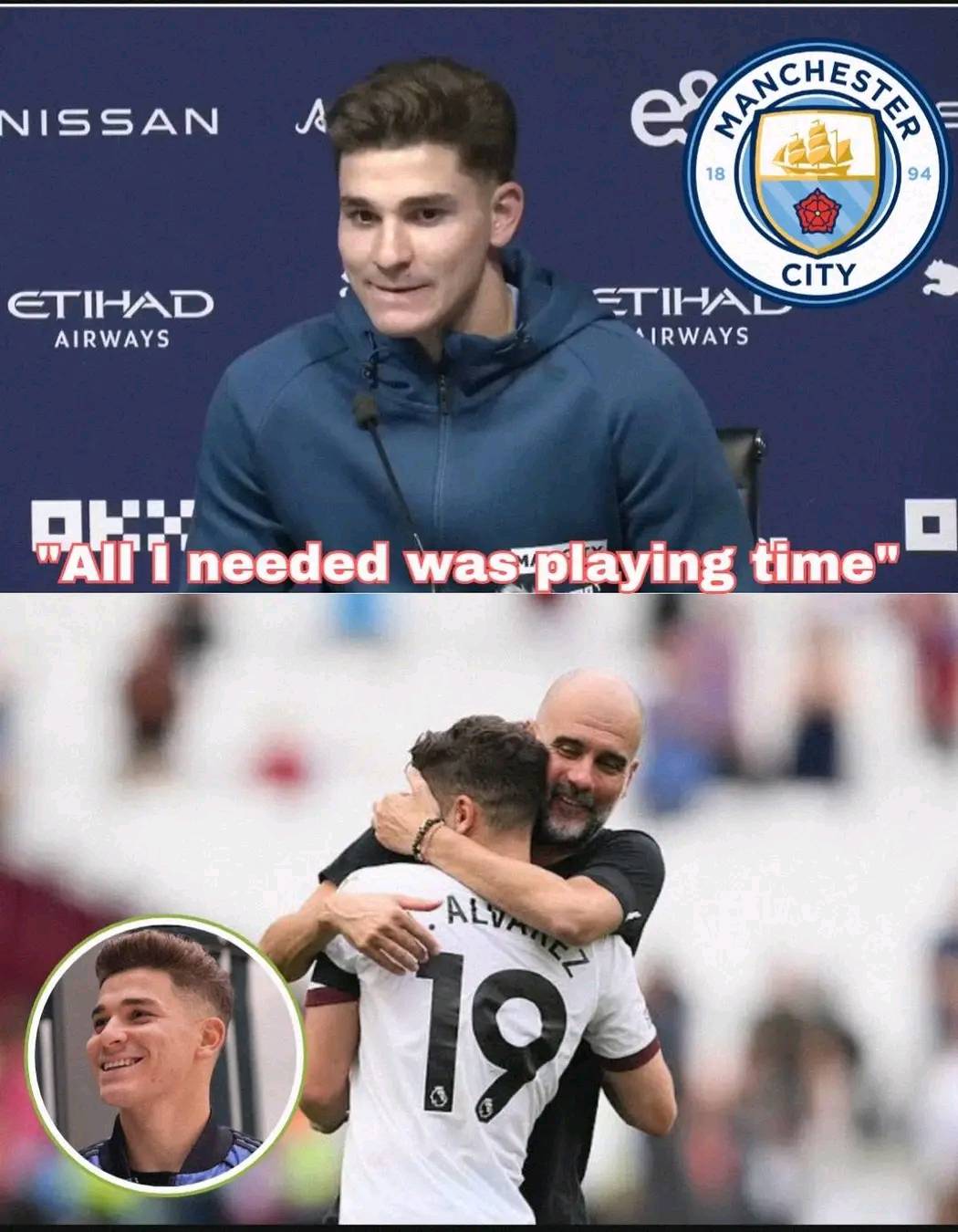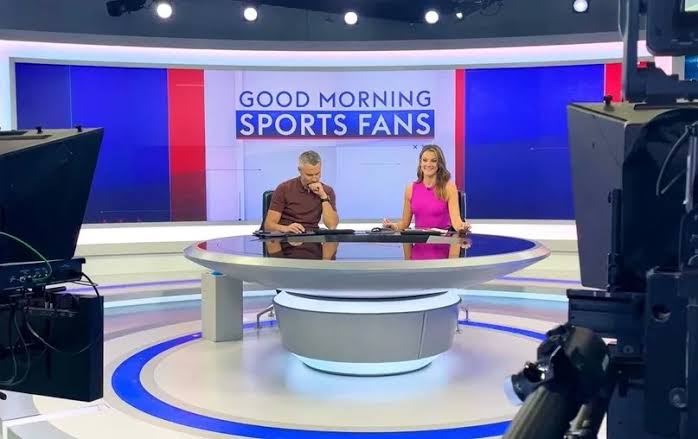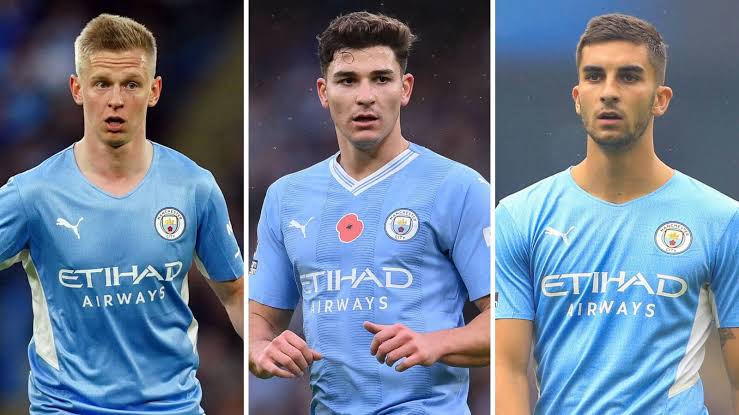“I never said anything wrong; all I needed at Manchester City was more playing time,

The summer of 2024 brought unexpected turbulence to Manchester City’s seemingly perfect attacking machinery. At the center of this storm stands Julian Alvarez, the 24-year-old Argentine striker whose meteoric rise from River Plate to the Etihad Stadium has been nothing short of spectacular. Yet, as the Olympic Games in Paris provided a backdrop for international football’s finest moments, a different kind of drama was unfolding in the press conferences and media interactions surrounding one of South America’s most promising talents.
Julian Alvarez’s response to Pep Guardiola’s comments about his future at Manchester City has sparked intense speculation across the football world. “I never said anything wrong; all I needed at Manchester City was more playing time,” Alvarez declared, setting the stage for what would become one of the most intriguing transfer sagas of the summer window. This statement, delivered with characteristic composure, encapsulates the complex relationship between ambition, opportunity, and loyalty that defines modern football’s elite level.
The Genesis of Discontent: Understanding Alvarez’s Perspective
To fully comprehend the current situation, one must examine Julian Alvarez’s journey at Manchester City through the lens of a player who arrived with enormous expectations and has consistently delivered when called upon. Since his arrival from River Plate, Alvarez has established himself as a reliable goal scorer and versatile attacking option for Pep Guardiola’s squad. However, reliability and versatility, while valuable assets, have not translated into the consistent starting role that a player of his caliber naturally craves.
The 2023-24 season proved particularly challenging for Alvarez in terms of playing time distribution. Despite his impressive goal-scoring record and his ability to perform in crucial moments, the Argentine found himself frequently relegated to a supporting role, watching from the sidelines as Manchester City’s biggest matches unfolded without his direct involvement. This situation created a natural tension between the club’s tactical needs and the player’s personal aspirations.
Alvarez’s frustration became palpable when he acknowledged his limited playing time during the previous season. His comments weren’t born from petulance or unprofessionalism, but rather from the legitimate concern of a world-class player who felt his contributions deserved greater recognition in terms of match opportunities. The striker expressed particular disappointment at being overlooked for significant matches, despite consistently demonstrating his goal-scoring prowess whenever given the chance.
Pep Guardiola’s Tactical Philosophy and Squad Management
Understanding Pep Guardiola’s approach to squad management provides crucial context for Alvarez’s situation. The Manchester City manager has built his reputation on tactical flexibility and the ability to maximize the potential of his entire squad rather than relying heavily on individual stars. This philosophy, while successful in terms of trophies and overall team performance, inevitably creates challenges for players who feel they deserve more prominent roles.
Guardiola’s response to Alvarez’s initial comments revealed the complexity of managing a squad filled with world-class talent. “I am aware that he desires to participate in significant moments, but so do the other players,” Guardiola stated during a Monday night press conference. This response highlighted the fundamental challenge facing any elite club: balancing the ambitions of individual players with the tactical requirements of the team.
The Spanish manager’s comment that “We have 18 to 19 athletes who are interested in participating in the significant events” underscores the depth of quality at Manchester City and the inherent difficulty in keeping every player satisfied with their role. Guardiola’s approach has always been to rotate his squad strategically, ensuring that players remain fresh while also maintaining competitive intensity within the group.
However, this rotation policy, while beneficial for the team’s overall performance across multiple competitions, can create frustration among players who feel capable of contributing more regularly to the biggest matches. Alvarez’s situation perfectly exemplifies this dilemma, as his talent and track record suggest he could be a regular starter for virtually any other top club in world football.
The Olympic Games: A Platform for Reflection
The timing of this transfer saga, coinciding with the Olympic Games in Paris, added another layer of complexity to the situation. For Alvarez, representing Argentina at the Olympics provided both a distraction from the club-level speculation and an opportunity to showcase his abilities on an international stage. The pressure of performing for his country while simultaneously dealing with questions about his club future required considerable mental fortitude.
Following Argentina’s convincing 2-0 victory over Ukraine, Alvarez found himself facing questions about Pep Guardiola’s response to his earlier comments. The striker’s handling of this situation demonstrated remarkable maturity and professionalism. Rather than escalating the tension or creating additional controversy, Alvarez chose to clarify his position while maintaining respect for his club and manager.
“Certainly, I was aware of Pep Guardiola’s statement,” Alvarez responded when questioned by TV Publica. “I have little to say. I have never made any erroneous statements. I have consistently maintained that I am exceedingly content and at ease at Manchester City.” This measured response revealed a player who, despite his frustrations, remained committed to handling the situation with dignity and professionalism.
Clarifying the Narrative: Alvarez’s Defensive Stance
Alvarez’s subsequent comments provided important clarification about his intentions and the media’s interpretation of his earlier statements. “It was merely an examination of the previous season and an assessment of what may occur in the future,” he explained, emphasizing that his comments had been taken out of context or perhaps blown out of proportion by media speculation.
The striker’s insistence that he had “never made any erroneous statements” highlighted his belief that expressing a desire for more playing time was both natural and reasonable for a player of his caliber. This defense of his position suggested that Alvarez felt his loyalty to Manchester City had been questioned unfairly, when in reality, he was simply being honest about his professional aspirations.
His comment that “That is what I meant when I said I would contemplate it, as we always do each year” provided crucial context for understanding his mindset. Rather than issuing an ultimatum or expressing dissatisfaction with the club, Alvarez was engaging in the kind of career reflection that any professional athlete undertakes regularly. This annual assessment of goals, opportunities, and career trajectory is standard practice in elite football.
Atletico Madrid’s Interest: A Tempting Alternative
While Alvarez and Guardiola engaged in their public dialogue, Atletico Madrid emerged as the most concrete alternative for the Argentine striker. The Madrid-based club’s interest in Alvarez represented more than just opportunistic pursuit of a talented player; it offered a potential solution to the playing time concerns that had sparked the entire controversy.
At Atletico Madrid, Alvarez would likely find the regular starting opportunities that have been somewhat elusive at Manchester City. Diego Simeone’s tactical approach and the club’s style of play could provide an ideal environment for Alvarez to flourish as a central figure rather than a rotation option. The prospect of leading the line for a club of Atletico’s stature, while playing in La Liga, one of the world’s most competitive leagues, presented an attractive proposition for the ambitious striker.
However, the interest from Atletico Madrid also created additional pressure on all parties involved. For Manchester City, losing a player of Alvarez’s quality would represent a significant blow to their squad depth and future planning. For Alvarez himself, the concrete interest from another top club forced him to make a definitive decision about his priorities and career trajectory.
Financial Considerations and Transfer Mechanics
The financial aspects of any potential transfer added another layer of complexity to the situation. Manchester City’s valuation of Alvarez, reportedly around €70 million with an additional €20 million in potential add-ons, reflected both his current ability and his future potential. This valuation positioned Alvarez among the most expensive strikers in the transfer market, underscoring his value to the club.
Manchester City’s approach to structuring any potential deal revealed their strategic thinking about player departures. The club’s consideration of including favorable clauses such as buy-back options or sell-on percentages demonstrated their awareness of Alvarez’s potential for further development. These clauses would allow City to benefit from any future increase in the player’s value while also complicating negotiations with interested clubs like Atletico Madrid.
The financial structuring of modern transfers has become increasingly sophisticated, with clubs seeking to protect their investments while also maximizing their negotiating positions. Manchester City’s experience with previous high-profile departures has informed their approach to the Alvarez situation, ensuring that any agreement would need to meet their strategic and financial objectives.
Squad Planning and Succession Strategies
The potential departure of Julian Alvarez would force Manchester City to address significant questions about their attacking options and long-term squad planning. Guardiola’s system relies heavily on having multiple options for each position, allowing for tactical flexibility and maintaining competitive intensity throughout the squad. Losing Alvarez would diminish this depth and require immediate attention in the transfer market.
Manchester City’s track record in the transfer market suggests they would be well-prepared to identify and pursue a suitable replacement for Alvarez. The club’s scouting network and analytical approach to player recruitment have consistently delivered high-quality additions to their squad. However, finding a player who combines Alvarez’s technical ability, tactical intelligence, and goal-scoring prowess would represent a significant challenge.
The interconnected nature of modern transfer markets means that Alvarez’s potential departure could trigger a chain reaction of moves across European football. His availability would likely attract interest from multiple top clubs, creating a competitive environment that could drive up his transfer fee and provide Manchester City with additional leverage in negotiations.
The Broader Context: Player Power in Modern Football
The Alvarez situation reflects broader trends in contemporary football regarding player empowerment and career management. Modern players, supported by sophisticated representation and detailed career planning, are increasingly willing to make their ambitions known publicly. This represents a significant shift from previous eras when players were expected to accept their roles without question.
The balance between club loyalty and personal ambition has become one of the defining tensions in elite football. Players like Alvarez, who have demonstrated their ability at the highest level, naturally seek opportunities that match their talents and aspirations. When these opportunities are limited at their current clubs, the temptation to explore alternatives becomes increasingly strong.
Manchester City’s handling of the Alvarez situation will likely influence how other players in similar positions approach their own career decisions. The club’s reputation for treating players fairly while also maintaining high standards for professionalism and commitment is at stake in how they navigate this particular challenge.
Media Dynamics and Public Perception
The role of media in amplifying and interpreting player comments has added another dimension to the Alvarez saga. The striker’s assertion that he “never said anything wrong” suggests that his original comments may have been interpreted more dramatically than intended. This highlights the challenges that modern players face in communicating their thoughts and feelings without creating unwanted controversy.
The 24-hour news cycle and social media environment mean that any comment from a high-profile player can quickly become the subject of intense speculation and analysis. Players must navigate this landscape carefully, balancing honesty about their ambitions with sensitivity to how their words might be interpreted by fans, media, and club officials.
Alvarez’s measured response to questions about Guardiola’s comments demonstrated an understanding of these dynamics. Rather than escalating the situation or providing additional fuel for speculation, he sought to clarify his position while maintaining respect for all parties involved.
Future Implications and Potential Outcomes
As the situation continues to develop, several potential outcomes remain possible. Alvarez could ultimately decide to remain at Manchester City, potentially with assurances about increased playing time or a more prominent role in the team’s tactical setup. Alternatively, he could pursue the opportunity at Atletico Madrid or another interested club, seeking the regular playing time that has been somewhat elusive at the Etihad Stadium.
The resolution of this situation will likely depend on a combination of factors including Manchester City’s willingness to provide guarantees about playing time, Atletico Madrid’s ability to meet City’s valuation, and Alvarez’s own assessment of his career priorities. The player’s age and stage of development make this decision particularly crucial, as the next few years could define the trajectory of his career.
Conclusion: Navigating Modern Football’s Complexities
The Julian Alvarez situation at Manchester City encapsulates many of the complexities that define modern elite football. The tension between individual ambition and team requirements, the role of media in shaping narratives, and the financial considerations that influence all major decisions in contemporary football are all present in this unfolding story.
Alvarez’s insistence that he “never said anything wrong” and his emphasis that he only needed “more playing time” at Manchester City reveals a player who understands his worth while attempting to navigate a challenging situation with professionalism and dignity. His approach to addressing Guardiola’s comments and clarifying his position demonstrates the maturity that has characterized his rapid rise in world football.
Regardless of the ultimate outcome, the handling of this situation by all parties involved will provide valuable insights into how modern football navigates the competing interests of clubs, players, and the media. For Alvarez, the coming weeks and months will be crucial in determining whether his future lies at the Etihad Stadium or elsewhere, but his professional approach to this challenging period has already enhanc















